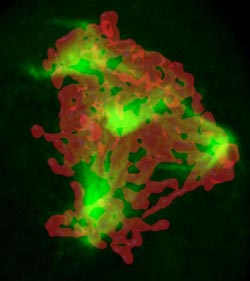Improved effectiveness of chemotherapy for cancer

So-called «mitotic catastrophe» of a tumour cell: The image shows that the tumour cell is no longer able to divide after chemotherapy. However, the chromosomes (red) are distributed unequally. If this damaged cell does not die, it can cause cancer again. The group of scientists gathered by Hans-Uwe Simon discovered how cell death can be triggered and this cancer risk prevented.<br><br>Hans-Uwe Simon, Institute of Pharmacology, University of Bern.<br>
Cells can break down damaged molecules as well as whole areas of the cells themselves by means of self-digestion and utilize the decomposition products resulting from this process for the production of energy and new molecules or cell parts.
This process of self-digestion is called autophagy and can be considered a renovation of the cell. The generation of energy by means of autophagy plays a special role for the cells if they do not have enough nutrients, oxygen or growth factors.
However, autophagy can also be used by tumour cells in order to survive stress situations such as chemotherapy – they digest the destroyed cell parts and regenerate themselves. This makes them resistant to the therapy. Now, a group of scientists from the University of Bern under the direction of Hans-Uwe Simon from the Institute of Pharmacology has discovered that the autophagy of tumour cells can be influenced with pharmacological means. The findings reveal new therapy approaches for the treatment of cancer. The study is published today in «Nature Communications».
Preventing the «reanimation» of tumour cells
The researchers studied the importance of autophagy for tumour cells. Often, chemotherapy alone is not able to destroy all of the tumour cells. While some of the tumour cells survive the therapy by means of autophagy, others go through a so-called «mitotic catastrophe», a state in which they are no longer able to divide. If these damaged cells do not die, they can cause cancer again.
Now, however, the group of scientists gathered by Hans-Uwe Simon has found a way to prevent the survival of cancer cells after chemotherapy. They discovered a connection between autophagy and mitotic catastrophe: when the self-digestion of cancer cells was suppressed by means of pharmaceuticals, the mitotic catastrophe directly resulted in cell death. This way, the survival mechanisms of cancer cells were eliminated.
With this method, the effectiveness of the usual chemotherapy can be significantly improved: “We hope that, based on these findings, we will be able to develop new therapies which will prevent the chemoresistance of established tumours”, said Hans-Uwe Simon, the head of the study.
Media Contact
More Information:
http://www.unibe.chAll latest news from the category: Health and Medicine
This subject area encompasses research and studies in the field of human medicine.
Among the wide-ranging list of topics covered here are anesthesiology, anatomy, surgery, human genetics, hygiene and environmental medicine, internal medicine, neurology, pharmacology, physiology, urology and dental medicine.
Newest articles

Superradiant atoms could push the boundaries of how precisely time can be measured
Superradiant atoms can help us measure time more precisely than ever. In a new study, researchers from the University of Copenhagen present a new method for measuring the time interval,…

Ion thermoelectric conversion devices for near room temperature
The electrode sheet of the thermoelectric device consists of ionic hydrogel, which is sandwiched between the electrodes to form, and the Prussian blue on the electrode undergoes a redox reaction…

Zap Energy achieves 37-million-degree temperatures in a compact device
New publication reports record electron temperatures for a small-scale, sheared-flow-stabilized Z-pinch fusion device. In the nine decades since humans first produced fusion reactions, only a few fusion technologies have demonstrated…





















